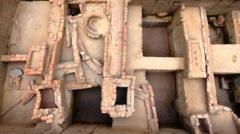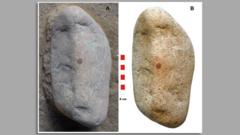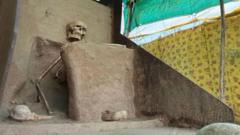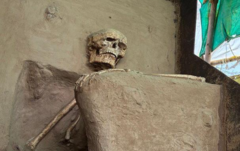The village of Keeladi in Tamil Nadu has emerged as a focal point of archaeological discovery and political contention. Recent digs have uncovered pits 15 feet deep containing terracotta remnants, industrial markers, and other artifacts believed to date between 580 BCE and 500 BCE—transforming perceptions of early civilization in India. These findings represent what archaeologists claim may have been a sophisticated urban society, featuring burial practices and specialized industrial spaces.
Ajay Kumar, who leads the excavation at Keeladi, reveals that the site contains elaborate brick structures and water systems indicative of a well-defined settlement, possibly the first of its kind discovered in Southern India. The 15,000 artifacts recovered suggest a society that was literate and engaged in organized urban practices, thus compelling historians to reconsider the timeline of civilization which has largely centered around the northern parts of India, particularly following the Indus Valley Civilization.
The discoveries have incited pride in Tamil Nadu while reigniting discussions regarding the historical narrative that has often sidelined the contributions of Southern regions. The debate touches upon the long-standing north-south divide within India’s historical discourse. Some local historians, like William Daniel, hail these findings, asserting that they establish the southern civilization's importance on par with that of the north.
Revisiting historical timelines aligned with the newly unearthed artifacts suggests that literacy in the Tamil Brahmi script could predate the Ashokan Brahmi script, previously thought to be the origin of many scripts in the region. Epigraphists and archaeologists argue these scripts might have developed independently, with Tamil scripts potentially influenced by the earlier Indus Valley civilization scripts. However, skepticism remains regarding the extent of migration from the Indus to the south.
Political critiques have emerged amid tensions surrounding the Archaeological Survey of India's (ASI) management of the Keeladi excavations. The recent transfer of ASI archaeologist Amarnath Ramakrishnan, who advocated for the site's excavation, was viewed by the Tamil Nadu government as a deliberate act to suppress the region's historical significance. Questions about the report initiated by Ramakrishnan have added to the political discourse, with accusations of tampering with Tamil heritage being levied.
As excavations continue, the uncovering of artifacts such as terracotta pipes indicates not only a connection within ancient domains but also the relevance of this site to contemporary discussions on identity. Journalist Sowmiya Ashok emphasizes that unearthing Keeladi sheds light on interconnected histories, arguing that the divisions present in modern India are less a reflection of the past than a consequence of the present-day narrative.
Thus, as discussions unfold around these significant archaeological findings, the ramifications of history are felt across a socio-political landscape shaped by assertions of cultural pride, identity, and the quest for familiarity with a shared past.






















